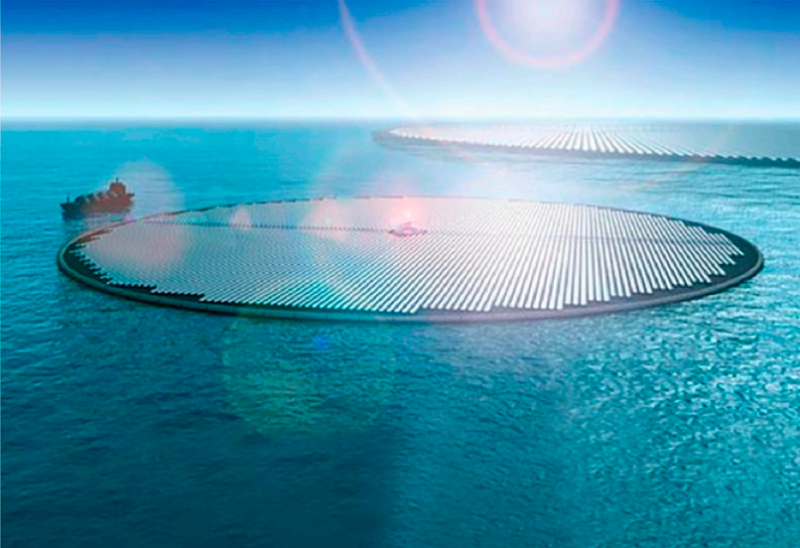
Imagine an open ocean, Sun beating down overhead, with 70 islands of solar panels, each 100 meters (328 feet) in diameter, bobbing silently out toward the horizon.
The cluster of islands is churning out electricity and sending it to a hard-hulled ship that acts as an oceanic factory. This factory uses desalinization and electrolysis equipment to extract hydrogen gas (H2) and carbon dioxide (CO2) from the surrounding ocean water. It then uses these products to create methanol, a liquid fuel that can be added into, or substituted for, transportation fuels. Every so often, a ship comes to offload the methanol and take it to a supply center on land.
This plan was outlined in a PNAS paper published this week, which suggests it's an option for addressing the global economy's over-reliance on liquid fossil fuels. Removing excess carbon dioxide from our environment is crucial to mitigating the effects of climate change. But electrifying trucks and planes has proved intractable in the near-term, so finding a "greener" option for liquid fuel is seen as a helpful half-step.
An ambitious proposal
The plan would rely on solar panels to provide an average of 24 megawatts (MW) of solar power when the Sun is out. A bank of batteries on the ship would store any excess energy so the methanol production could continue at night.
The bulk of the power would be used to run desalination and electrolysis equipment. Electrolysis is one way to make hydrogen gas, using electricity to split water into hydrogen and oxygen. Of course, the only water available to this plant is seawater, so it has to be desalinated first, otherwise undesirable byproducts and buildup will contaminate the catalysts. (Research into creating hydrogen from salt water without desalination is ongoing. One company claims it can do this already, but it has yet to demonstrate or describe how the process works.)
The factory will also extract excess CO2 from the oceans. Oceans absorb atmospheric CO2, causing acidification under current conditions. The researchers argue that it's easier to extract excess carbon dioxide from an ocean environment than from ambient air because the effective concentration of dissolved carbon dioxide is 125 times greater in seawater than it is in air.
To do this extraction, the sea-based factory will employ a prototype device that separates the contents of seawater to create acidic and base channels of water. "By thus reducing the acid channel pH to below 5, CO2 comes out of solution and is collected using membrane contactors," the paper explains. Once the CO2 is collected, the acid and base channels of water are recombined and released.
Finally, the hydrogen and carbon dioxide that are collected need to get combined into methanol. The paper proposes a method of CO2 hydrogenation using a selective catalyst, and it suggests that heat from the previous processes can be recycled to make the methanol synthesis more efficient.
The end result is a system that produces 15,300 t/y of methanol and has an energy storage efficiency of 8% over a 20-year lifetime.
Is this even possible
The researchers estimated that we would need approximately 170,000 of these solar island systems to be able to produce enough green methanol to replace all fossil fuels used in long-haul transportation. While that seems like a lot, it's theoretically possible, even if we restrict these systems to ocean expanses where waves don't reach more than seven feet high and there's enough sunlight to meet the system's yearly average need.
Still, the authors admit that this is just the description of a possible prototype: whether it's practical to build or not will depend on the cost of the technology that supports the system, as well as the cost of competing forms of energy used in transportation. Cleaning and maintaining this equipment in a marine environment is also a concern, and the researchers admit that there may be room for alternate setups (like making another fuel instead of methanol) that might make more economic sense.
For now, though, it's a compelling idea to avoid additional fossil fuel extraction that is within reach using existing technology.
DOI: PNAS, 2019. https://doi.org/10.1073/pnas.1902335116 (About DOIs).
reader comments
162